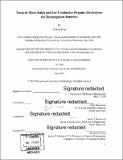Towards more stable and ion-conductive organic electrolytes for rechargeable batteries
Author(s)
Feng, Shuting,Ph.D.Massachusetts Institute of Technology.
Download1121594374-MIT.pdf (25.07Mb)
Other Contributors
Massachusetts Institute of Technology. Department of Chemical Engineering.
Advisor
Yang Shao-Horn and Paula T. Hammond.
Terms of use
Metadata
Show full item recordAbstract
The global society urgently needs to remedy the effects of climate change resulting from burning fossil fuels and significantly increase the utilization of renewable energy. Rechargeable batteries are important enablers of sustainable energy use, as they can be employed to store energy generated from renewable but intermittent source. Enhancing the functionality of battery electrolytes, such as (electro)chemical stability and ion conductivity, can improve battery energy density, operation efficiency, and safety. This thesis explores strategies to improve the stability and ion conductivity of organic electrolytes for rechargeable batteries. Special attention is given to aprotic lithium-oxygen (Li-O₂) batteries, which offer theoretical energy densities that are 2 to 4 times increase over the state-of-the-art Li-ion batteries (LIBs). Currently, the practical development of rechargeable Li-O₂ batteries is hindered by severe electrolyte degradations. Numerous families of organic solvents, polymers, and ionic liquids have been evaluated as electrolyte candidates; none are stable against the oxygen electrode in LiO₂ batteries. Moreover, the decomposition pathways of many molecules are poorly understood. To investigate the structure-property relationships governing the stability of organic molecules in aprotic Li-O₂ electrode environment, we developed and applied a comprehensive stability framework to a library of organic molecules with varied functionalities using density functional theory (DFT) calculations. Additionally, the chemical stability of the molecules was investigated experimentally. The computed and experimental results were in excellent agreement, and have been employed to identify unstable chemical moieties at the molecular level and to provide insight into the design of new electrolytes that would be stable in Li-O₂ battery environment. Using the guiding principles provided by this stability framework, we developed three sulfamide- and sulfonamide-based electrolyte solvents that exhibited exceptional stability under aprotic Li-O₂ conditions. In particular, the sulfonamide-based electrolytes have been found to be stable for >90 cycles in a Li-O₂ cell, highlighting the power of rational molecular design for the development of stable and ion-conductive organic electrolytes for next-generation batteries.
Description
Thesis: Ph. D., Massachusetts Institute of Technology, Department of Chemical Engineering, 2019 Cataloged from PDF version of thesis. Includes bibliographical references (pages 114-127).
Date issued
2019Department
Massachusetts Institute of Technology. Department of Chemical EngineeringPublisher
Massachusetts Institute of Technology
Keywords
Chemical Engineering.